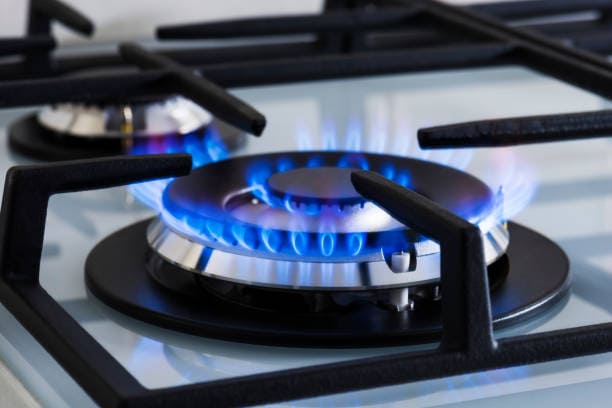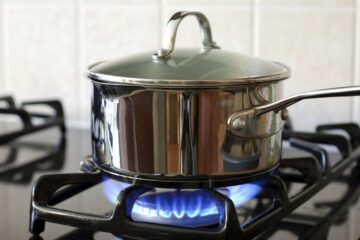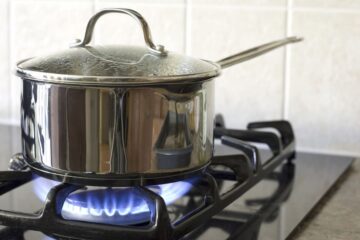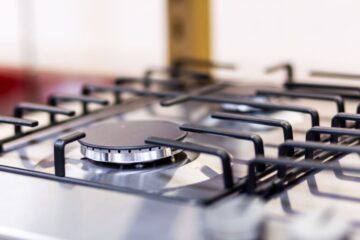Many people have natural gas stoves and propane barbecue grills. However, there are many instances in which they would like to use propane as opposed to natural gas, either because they have run out of natural gas or because they plan on using the stove outside and don’t want to have to rely on an extension cord, especially during inclement weather.
So what happens if you use propane on a natural gas stove? Is it even possible? How do you go about doing it safely and correctly? Keep reading to find out!
Can You Use Propane Instead Of Natural Gas For A Stove?
Using propane gas in a natural gas stove is unsafe, as the two gases have different burning temperatures. Propane gas is much hotter than natural gas so it can create an excessive blaze.
Propane gas is not meant to be used with natural gas stoves because the two have different combustion rates. Natural gas burns at a slower rate than propane, which means that when you burn them together, it can result in an explosion.
Can Propane And Natural Gas Be Used Together?
Yes, propane and natural gas can be used together.
Propane is a fossil fuel and one of the most common for heating and cooking. Propane is also widely used in fireplaces, stoves, and water heaters.
Natural gas has become a popular choice for many homeowners who want to use it as their primary energy source. Unlike propane, natural gas is considered cleaner than propane because it doesn’t produce carbon dioxide when burned.
When you combine these two fuels, you’ll find they work great together! You can use them simultaneously or alternate depending on your needs.
Do Gas Stoves Use Propane Or Natural Gas?
If you’ve been using an electric stove and are looking to convert to a gas one, you’ll need to ensure that the stove can accommodate propane. There are several different types of stoves available, so it’s important to do some research before you buy one.
The most common type of gas stove is the natural gas model. These stoves are designed for indoor cooking and typically have a flame control knob that turns the flame down when you’re not using it. The flame control knob is located at the top of the stove. It can be adjusted by turning it clockwise or counterclockwise, depending on how hot you want your flame to be.
If your old electric stove doesn’t have this feature, there are some ways to adjust your existing stove so that it will work with propane. For example, some models come with removable burners that allow users to easily switch between electric and natural gas modes without replacing entire parts of their stoves. Some stoves even come with a built-in valve that can be converted into both fuel types without any extra parts needed!
What Is the Difference Between Propane And Natural Gas?
Propane and natural gas are used as fuel by homes, businesses, and industries. They have the same chemical composition, which means they are interchangeable.
They are both sourced from natural resources but have different properties. Propane is a hydrocarbon, while natural gas comprises compounds like hydrogen and carbon dioxide.
Propane is a gas with a higher boiling point than natural gas, making it ideal for heating or cooking. Propane is also easy to transport through pipelines, which makes it popular among industry users who need to transport large amounts of propane.
Natural gas is a fossil fuel created over millions of years by decomposing plant matter. It is an odorless and colorless gas that can be easily liquefied at room temperature using pressure (which makes it easier to transport). Natural gas is non-toxic and can be burned without producing harmful environmental emissions.
What Happens If You Use Propane On A Natural Gas Stove?
If you’re considering using propane on a natural gas stove, you should know a few things. Using propane can be dangerous if not done properly, so it’s important to be informed before you try it. Check out this article section to learn more about what can happen if you use propane on a natural gas stove.
1. Difficulty in Lighting
One of the most common complaints about natural gas stoves is that they are difficult to light. The problem is not with the stove itself but rather with the type of flame used by the burner.
When using propane on a natural gas stove, it is important to understand how it works and how to adjust it properly. Most people find that using a match or lighter will not work very well, leaving them frustrated with their efforts.
A better alternative is to use an alcohol lamp or candle (which you can purchase at any home improvement store). These may be more expensive initially, but they are easier to use than matches or lighters and will last longer too!
2. Gaps in your flame
When you use propane on a natural gas stove, you will also notice gaps in your flame. You might think that this is normal, but it isn’t. This is because propane has a higher octane rating than natural gas and is not compatible with all types of burners. This means that some burners cannot handle the high-octane fuel and will produce a gap in your flame when ignited by the pilot light or automatic ignition system.
The best way to avoid gaps in your gas stove’s flame is by using a high-octane version of propane when cooking with an electric fire starter kit or other appliance that requires it. This will ensure no gaps in your flame and keep the burner from being damaged due to the use of low-octane fuel sources like kerosene or jet fuel.
3. Inefficient heat production
If you use propane on a natural gas stove, you’ll also be using it inefficiently, which means you’ll waste it. Propane has a lower BTU value than gas, so it takes more fuel to produce the same amount of heat. Suppose you’re cooking with a small amount of propane. In that case, your stovetop may be unnecessarily high amounts of fuel simply because it’s inefficient enough to produce the same heat as the real thing.
4. Bad odors from your stove
If you use propane on a natural gas stove, you may notice that your stove is emitting a bad odor. This is because propane is heavier than air and will settle in your home’s vents. This can cause a foul smell that lasts days or weeks after using propane.
The best way to avoid this problem is to vent any unused stove parts after each use. You can also open all of your windows and doors while using your stove, allowing fresh air into the house and preventing any odors from building up within it.
5. No Flame on the Stovetop
The flame doesn’t go out when you use propane on a natural gas stove. It merely goes from blue to orange. You can still cook and even turn the heat down if you want.
But, if you want to turn off the flame completely, you’ll need to remove the propane tank from the burner assembly and turn off the valve inside. The reason is that there’s no way to turn off just the gas supply without turning off all of it at once.
6. The Stove Does Not Stay Lit
If you use propane on a natural gas stove, the stove will not stay lit.
Your stove may be malfunctioning. If this is the case, you should contact an appliance repair professional to have it repaired or replaced.
If you suspect something is wrong with your stove, do not attempt to repair it yourself. Instead, contact a technician who can help you determine if your appliance has a problem and how to fix it.
7. Broken Oven Pilot Light
A loose gas valve is one of the most common causes of a broken oven pilot light. This is because the gas valve controls the flame and the igniter, and if it’s not working properly, you may see a spark but no flame.
In this case, you will need to remove the oven door and inspect the pilot light for any damage or debris that might have clogged it. You’ll also want to check for debris that may have fallen into your gas line or regulator. If necessary, clean it out with a soft brush or pipe cleaner.
8. Odors and Leaks
The biggest problem with propane stoves is that they release a lot of odor. You will be able to smell the gas, which can get annoying, especially if you cook for a large group or family. Another common complaint about propane stoves is that they create a lot of condensation inside the house, which can lead to leaks around the stove.
If you notice any condensation on windows or inside your house, it could indicate a leak somewhere in your home. This can be difficult to track down since propane smells so strong, and you might not notice it until after you start noticing moisture on windows or inside your home.
9. Possible Property Damage
If you have a natural gas stove, you might be tempted to use propane for cooking. But using this fuel in combination with your stove could cause serious damage to the appliance. Propane is highly flammable and can ignite at temperatures as low as -20°F (or -29°C). If you accidentally use a canister of propane on a natural gas stove, it could cause an explosion that could result in serious property damage.
10. The Burners Are Too Hot
If you experience an overwhelming smell of propane from your stove, it means that there is too much propane coming out of your stove, and it needs to be adjusted accordingly. You can do this by turning down the knob on top of your stove and adding more fuel to your tank.
11. Unsafe Cooking Conditions
If you’re cooking with propane, there’s also the possibility that your food will be cooked too fast. A sudden increase in heat can cause your food to burn or even explode if it’s not properly prepared beforehand. This can cause property damage and injury to anyone nearby during the cooking process. You must cook your food slowly and carefully. Hence, there isn’t any unnecessary risk involved with using an outdoor stove indoors!
- Does A Natural Gas Cooktop Need A Regulator?
- How To Tell If Your Stove Is Electric Or Gas? (Helpful Guide)
Why do You need To Convert Natural Gas Stove To Propane? Reasons
According to research, the amount of energy used for cooking is about 40% of household energy. This is mainly because people still use natural gas in cooking. In comparison, propane is more efficient and has lesser emissions. This blog section will look at the benefits of propane over natural gas and how to convert your natural gas stove to propane.
- The first reason why you need to convert natural gas stove to propane is that the heating element on a natural gas stove is made of metal. That metal can cause corrosion in your propane tank.
- Another reason you need to convert natural gas stove to propane is that the metal heat element on your natural gas stove can release harmful gases into the atmosphere.
- Yet another reason you need to convert natural gas stove to propane is that burning natural gas produces carbon monoxide, which is toxic and can cause death if inhaled in large amounts.
- The last reason you need to convert natural gas stove to propane is that using a propane-powered stove saves money by reducing your electricity bill while still providing satisfactory cooking performance and energy efficiency.
Can You Fill A Propane Tank With Natural Gas?
An old saying goes, “an ounce of prevention is worth a pound of cure.” And that’s exactly what you want to do regarding propane tanks.
Because if you have a propane tank filling it with natural gas, there’s a good chance it won’t work out for you.
Propane tanks are designed for one thing: propane. They’re not made for anything else and can’t be filled with natural gas—even though the bottles themselves say “natural gas” on them. This is because the pressure inside the tank is too high for natural gas to flow through. So even if you try to fill it up with natural gas and keep trying until you get it all in there, chances are pretty good that your tank will burst at some point in the future.
When filling your propane tank with natural gas, the best thing to do is leave it alone!
Does Natural Gas Burn Hotter Than Propane?
Because natural gas is cleaner than propane, it burns hotter.
Propane is a very common fuel for outdoor grills. It is also used in leaky propane tanks, but this issue can be fixed with a repair kit. The problem with propane is that it’s very explosive. If you don’t have a way to ensure your tank is secure and leak-free, there are some serious safety concerns when using it indoors or outdoors.
Natural gas burns hotter than propane because natural gas heats up faster than propane does. This means that when you have a natural gas grill that uses both fuels, the combination of their heat output will be higher than either one alone would offer.
Related Queries
What Happens If You Use Propane On A Natural Gas Grill?
- The propane tank will be empty after you light it, so make sure you have a full tank when you start the grill.
- Propane is heavier than air, so it settles to the bottom of the tank and can’t escape when you’re not using it. This means that if you leave your grill unused for a long period, there’s a good chance that it will run out of gas before you even know it.
- If your grill is connected to a natural gas supply pipe, then this pipe is made from metal and can rust over time. This could cause a leak that could burn down your house or kill an innocent bystander.
- If you’re using an older model natural gas grill with metal tanks or pipes instead of plastic ones, this could also lead to leaks in these components, resulting in damage or even combustion!
Propane Tank For Gas Stove
Enjoying your gas stove is best with a propane tank stove. This will ensure that you have plenty of fuel and will last longer than a disposable canister.
There are many options for purchasing a propane tank for your gas stove.
The first thing you need to do is think about what kind of gas stove you have. There are three gas stoves: electric, wood-burning, and pellet stoves. Electric stoves are easy to use and only require electricity from the grid.
Wood burning stoves require natural gas or propane tanks. Still, they provide more heat than electric stoves because they burn real wood logs rather than electricity generated by an electric current through wires inside an oven cavity filled with hot air, as an electric oven does.
Pellet stoves are made with pellets rather than wood logs, so they burn faster but don’t provide as much heat as wood-burning stoves because they don’t produce smoke like others.
Blowing Out Propane Lines
Propane is a great fuel for your grill. It’s safe, clean, and easy to use. But sometimes, it can be dangerous—especially if you have an improperly installed propane line.
If your propane line has been damaged or there’s a leak in your system, you may have to replace it before you can use your grill again. This can be expensive and time-consuming, but there are some simple steps you can take so that it doesn’t happen again.
The first step is to disconnect from any other sources of power. You may have another source of electricity in the area that could cause a spark or explosion if connected to the propane lines while they are damaged or leaking. For example, if someone else has used their electrical cord in a way that could cause a short circuit or electrocution, then disconnect them from power until repairs are made.
Another thing that might cause damage to your propane lines is excess weight on top of them. This can cause them to buckle under pressure and crack or break apart into smaller pieces. If you feel like there’s too much weight on top of them (like when carrying groceries inside), then go ahead and remove some items from it.
What Is An Lpg Conversion Kit Cooker?
An LPG conversion kit cooker is a piece of equipment that allows you to convert your car into an LPG car. A conversion kit cooker allows you to cook food inside your vehicle. You can use it for camping or as emergency cooking tools while out in the wilderness.
A conversion kit can be used to cook anything from hot dogs and potatoes to eggs and bacon. These cookers produce no smoke or smell like gas when operating, so they’re great for cooking outdoors or in small spaces like tents.
Conversion kits come in different designs and sizes, depending on how much room you have inside your car and how much cooking space you need. Some kits are made from plastic, while others are made from stainless steel. Some also come with handles on both sides, making it easier to move around when empty or full of food!
Can A Gas Fireplace Explode?
Gas fireplaces are safe, but they’re not without their risks.
Gas fires are generally safer than electric ones because they don’t have the same risk of catching on fire or exploding. If you have a gas fireplace, you’ll want to ensure that the unit is installed properly and that it’s not leaking gas.
Gas fireplaces can explode if there’s an ignition source nearby (such as a pilot light or pilot flame). If this happens, it could cause serious injury to anyone in the room. The only solution is to call an emergency repair service immediately to ensure no one gets hurt.
The Final Words
If you use propane on a natural gas stove, you can cause a fire or explosion. This is because propane is heavier than air and natural gas is lighter than air. Propane gas will sink to the bottom of the room that you are in, and the natural gas will rise to the top.
If you use the two gases in the same room, you will have a dangerous gas leak that can cause a fire or explosion. If you want to use propane and natural gas, you must ensure they are in separate rooms.
Frequently Asked Questions
How Do You Know If Your Gas Stove Is Natural Gas Or Propane?
The serial tag and rating plate on your natural gas or liquid propane appliance will have information about the gas type. The manual for your appliance will also include this information.
It’s important to know the gas type of your appliance to use the right fuel and operating pressure. The information on the tag and rating plate will help you do this. You can also find this information in the manual.
Is It Possible To Convert A Natural Gas Stove To Propane, And How Is It Done?
Although many appliances can run on either natural gas or propane, not all are compatible with both. Make sure to check your appliance’s requirements before purchasing fuel.
Can You Run A Gas Range On Propane?
Though it is possible to convert your home from natural gas to propane, there are certain risks involved in the process that you need to be aware of before starting. Make sure you understand all the potential hazards and speak with a professional if you have any doubts – it’s not worth risking your safety!



